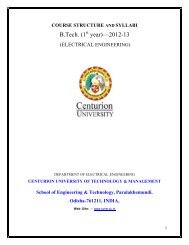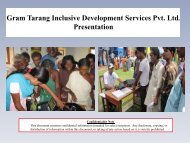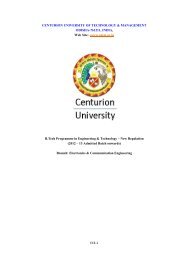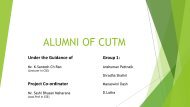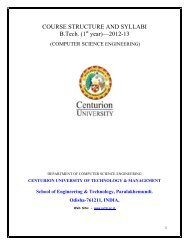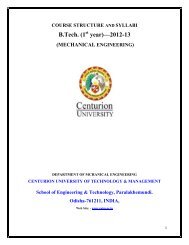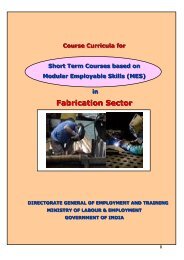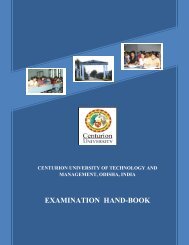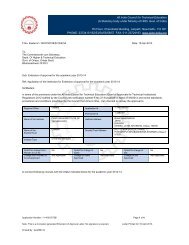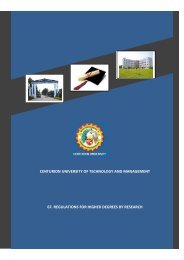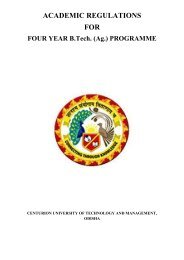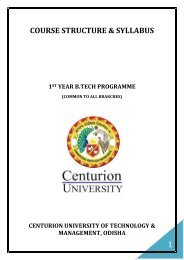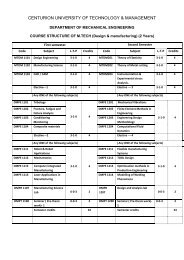CSE - Centurion University
CSE - Centurion University
CSE - Centurion University
Create successful ePaper yourself
Turn your PDF publications into a flip-book with our unique Google optimized e-Paper software.
Module 1 18Hrs<br />
7 TH SEMESTER<br />
PCCS4101 ARTIFICIAL INTELLIGENCE<br />
What is Artificial Intelligence? AI Technique, Level of the Model,Problem Spaces, and Search:<br />
Defining the Problem as a State Space Search, Production Systems, Problem Characteristics,<br />
Production System Characteristics, Issues in the Design of Search Programs.Heuristic Search<br />
Techniques: Generate-and-Test, Hill Climbing, Best-first Search, Problem Reduction, Constraint<br />
Satisfaction, Means-ends Analysis,Knowledge Representation: Representations and Mappings,<br />
Approaches to Knowledge Representation, Using Predicate Logic: Representing Simple Facts in<br />
Logic, Representing Instance and ISA Relationships, Computable Functions and Predicates,<br />
Resolution, Natural Deduction.Using Rules: Procedural Versus Declarative Knowledge, Logic<br />
Programming, Forward Versus Backward Reasoning, Matching, Control Knowledge.Symbolic<br />
Reasoning Under Uncertainty: Introduction to Nonmonotonic Reasoning, Logics for Nonmonotonic<br />
Reasoning, Implementation Issues, Augmenting a Problem-solver, Depth-first Search, Breadth-first<br />
Search.Weak and Strong Slot-and-Filler Structures: Semantic Nets, Frames, Conceptual<br />
DependencyScripts, CYC.<br />
Module 2 16Hrs<br />
Game Playing: The Minimax Search Procedure, Adding Alpha-beta Cutoffs, Iterative<br />
Deepening.Planning: The Blocks World, Components of a Planning System, Goal Stack Planning,<br />
Nonlinear Planning Using Constraint Posting, Hierarchical PlanningOther Planning<br />
Techniques.Understanding: What is Understanding, What Makes Understanding Hard?,<br />
Understanding as Constraint Satisfaction.Natural Language Processing: Introduction, Syntactic<br />
Processing, Semantic Analysis, Discourse and Pragmatic Processing, Statistical Natural Language<br />
Processing, Spell Checking.<br />
Module 3 16Hrs<br />
Learning: Rote Learning, Learning by Taking Advice, Learning in Problem-solving, Learning from<br />
Examples: Induction, Explanation-based Learning, Discovery, Analogy, Formal Learning Theory,<br />
Neural Net Learning and Genetic Learning. Expert Systems: Representing and Using Domain<br />
Knowledge, Expert System Shells, Explanation, Knowledge Acquisition.<br />
Text Book:<br />
1. Elaine Rich, Kevin Knight, &Shivashankar B Nair, Artificial Intelligence, McGraw Hill, 3rd<br />
ed.,2009<br />
References:<br />
1) Introduction to Artificial Intelligence & Expert Systems, Dan W Patterson, PHI.,2010<br />
2) S Kaushik, Artificial Intelligence, Cengage Learning, 1st ed.2011<br />
64



